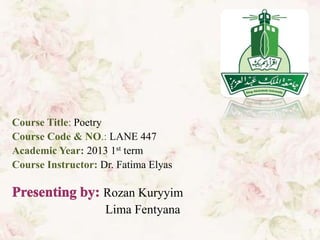
Poetry, Pres#1: Rozan & Lima
- 1. Course Title: Poetry Course Code & NO.: LANE 447 Academic Year: 2013 1st term Course Instructor: Dr. Fatima Elyas Rozan Kuryyim Lima Fentyana
- 2. The Renaissance Shakespeare’s Shall I Compare Thee to a Summer’s Day?
- 3. The Renaissance 1485-1625 • The Renaissance: French: Renaissance, Original Italian: Rinascimento, from rinascere "to be reborn” • A cultural movement that spanned from the 14th to the 17th century, beginning in Italy in the Late Middle Ages and later spreading to the rest of Europe
- 4. The English Renaissance 1485-1625 • The spirit of Optimism - An awakening from the long slumber (sleep) of the Dark Ages - There was the sincerely held belief that humanity was making progress towards a noble summit of perfect existence • Nationalism and the first flourishing of Democracy • Middle class began to gain power in societies • The great innovation of Printing Press by Johannes Gutenberg • Poets experimented with form, and Dramatists revived and reinvented the classical traditions of the Greeks and Romans
- 5. Literature of the Renaissance (poetry) Popular forms of poetry: • The lyric, the elegy, the tragedy, the pastoral , also ,the Sonnet and the epic which were very popular forms Themes of poetry: • Human development and education • Love and passion • Classic antiquity and Politics • Religion
- 6. Canons of Renaissance poetry The central figures of the Renaissance canon are: • Edmund Spenser: The Faerie Queen (epic) • Sir Philip Sidney: Astrophel and Stella (first Elizabethan sonnet cycle) • Christopher Marlowe: popularized pastoral verse • William Shakespeare • Ben Jonson • John Donne • John Milton: Paradise Lost (epic, widely considered the grandest poem in the language)
- 7. William Shakespeare 1563- 1616 • Elizabethan poet and playwright • Widely regarded as the greatest writer in English literature • Wrote 37 plays and 154 sonnets
- 8. Sonnets • Italian word sonetto, meaning "little sound“ • a form of a poem that originated in Europe, mainly Italy • contain 14 lines • The rhyme scheme in a Shakespearean sonnet is a-b-a-b, c-d- c-d, e-f-e-f, g-g; the last two lines are a rhyming couplet
- 9. Shall I compare thee to a summer’s day? Sonnet 18 Shall I compare thee to a summer’s day? Metaphor Thou art more lovely and more temperate: Rough winds do shake the darling buds of May, Imagery And summer’s lease hath all too short a date: Sometime too hot the eye of heaven shines, Personification And often is his gold complexion dimm’d; And every fair from fair sometime declines, By chance or nature’s changing course untrimm’d; But thy eternal summer shall not fade Nor lose possession of that fair thou owest; Nor shall Death brag thou wander’st in his shade, When in eternal lines to time thou growest: So long as men can breathe or eyes can see, So long lives this, and this gives life to thee.
- 10. •The speaker opens the sonnet with a question to the beloved, and he is comparing a summer’s day to the beauty of this beloved. • He is saying that the summer’s day maybe beautiful sometimes but not always, just of a period of time. • Shakespeare personifies the sun by giving it a face. He is saying that the sun shines too much some days but other days the sun’s face is hidden by clouds unlike the youth’s beauty, its temperate. •The poet is saying that beauty in general declines at some point, but his beloved beauty will never end. It will always be perfect, nothing threatens her beauty even death. This makes his beloved like a god. • The poet says that his poetry and the memory of his beloved will last “So long as men can breathe or eyes can see, So long lives this, and this gives life to thee.”
- 11. Themes Love and passion How the poet is comparing his beloved to a summer’s day gives suggestion that he adores his beloved, he wrote this poem to make the beloved beauty lasts forever as long as people are reading this poem
- 12. Resources • http://www.online-literature.com/periods/renaissance.php • http://en.wikipedia.org/wiki/The_Renaissance • http://www.wisegeek.com/what-is-renaissance-poetry.htm • http://en.wikipedia.org/wiki/Sonnet • http://www.shakespeare-online.com/sonnets/18detail.html • http://www.sparknotes.com/shakespeare/shakesonnets/secti on2.rhtml
